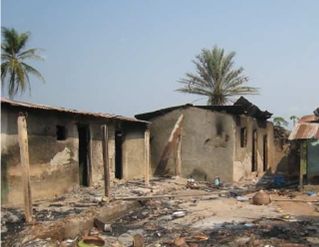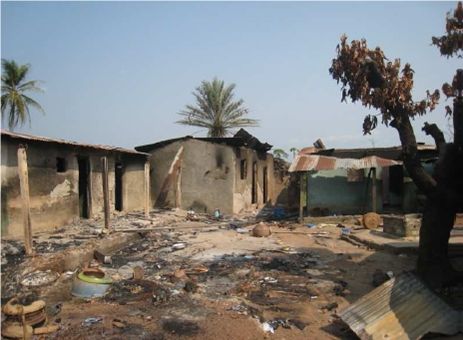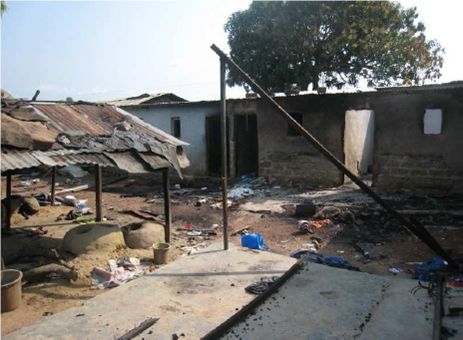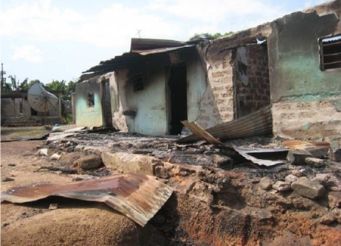
Publisher:
Bonnie King
CONTACT:
Newsroom@Salem-news.com
Advertising:
Adsales@Salem-news.com

~Truth~
~Justice~
~Peace~
TJP
Feb-25-2011 15:36

 TweetFollow @OregonNews
TweetFollow @OregonNews
Côte d'Ivoire: Burned Homes, Rapes, Disappearances & Executions
Alysha Atma Salem-News.com African Affairs CorrespondentAmnesty International is calling on all parties to quell the human abuse.
 Photos: Amnesty International |
(PORTLAND, Ore.) - UN High Commissioner for Refugees (UNHCR), António Guterres, today is appealing for urgent help for civilians caught in the fighting in the Abobo district of Cote d’Ivoire’s Abidjan. For two days, fighting has been under way, with thousands of people having fled the area. Fleeing residents told UNHCR staff, “many people are still trapped inside, including pregnant women, elderly people, and handicapped people.”
“This is fighting in the heart of a major African city. It is imperative that the fighting stop so that civilians can be brought out and to safety,” Guterres said. “The parties involved must do everything possible to avoid any further endangering of the population.”
The fighting that erupted in Abidjan and western Cote d’Ivoire this week has resulted in a sharp surge in cross-border displacement. On Friday, the Liberian authorities reported that 5,000 people had crossed into eastern Liberia since Thursday, compared to a recent average of around 100 people a day.
Amnesty International (AI) has just returned from a four week investigation. They have been speaking and documenting the ongoing human rights violations in Côte d’Ivoire, where the disputed November 2010 presidential election is causing continued dissension.
The ensuing political rift between outgoing President Laurent Gbagbo and the security forces loyal to him and Alassane Ouattara, the internationally recognized winner of the election and his Forces Nouvelles (FN); are causing continued civilian abuses including, extra-judicial executions, ill treatment, arbitrary detention, disappearances and sexual violence including rape.
Extrajudicial executions and excessive use of force
“The night of 5-6 December a large group of forces came to our home, some in uniforms and others in plain clothes; we did not open and from the window saw seven cargos (pick-up vehicles). When we thought they had gone we opened the door and me and my brother, Fofana Youssouf, went out but more forces were still there and started shooting. We rushed back into the courtyard and at that point my brother was hit. He died shortly after.”
January 19, 2011, Bamba Mamadou, nicknamed Solo, a football player, was beaten to the ground and then shot dead by security forces patrolling the Banfora Adjamé neighborhood of Abidjan.
“Between 7:00 and 8:00 a.m., I saw members of the security forces in a car shooting in the air. Then I saw four people, including three in uniform punching and kicking Mamadou who was lying on the ground. Another member of the security forces shot him dead.”
Rape
19 December, they came to my house in Abobo. They came in the middle of the night; I was sleeping with my husband and my children. They were hammering at the door. Our door is right on the street, we didn’t open. They then broke down the door, our door is made of wood. They came in, eight of them, four in plain clothes and four soldiers in military fatigues and balaclavas. Two of them took my husband outside and six of them came upon me. They told me to undress and when I didn’t, they came at me again. They all took turns raping me and threw my children to the floor, the children were crying. I was screaming. I don’t know what they were doing to my husband. After, I heard two gun shots. Then they left and I found my husband outside lying on his stomach. He was dead. The people who raped me and killed my husband told me that if I wanted to complain, I should go to Alassane Ouattara.”
Last January, in the same village, a woman and a 15-year-old girl were raped by a FN commander.
“I was going home, at about 4:00 p.m. This FN commander forced me into his vehicle, drove to a field outside the village and raped me in the back of the vehicle; then he left me there and left; I walked home. I told a friend of his what he had done.
At night he came to our home; I fled to the fields near home with my brother. When my mother said that I was not home he saw my brother's wife and he hit her; he said she knew where I was. Then they arrested my brother and my father. Now I cannot go home anymore; I am in hiding with relatives far away
Disappearances
A number of people have disappeared after being arrested by security forces, this was especially common during the December 16 demonstration.
“A group of security forces and militiamen arrested him, they took off his clothes and began to beat him with clubs and gun butts. We fled and then I called him on his mobile. A voice answered me and told me that they were killing Dao. We went to look for him in all the police stations and in the morgues and couldn’t find him”.
There are reports that he is being held with some 50 others at the headquarters of the Republican Guard.
Abuse
Two journalists, Sanogo Aboubakar and Kangbe Yayoro Charles Lopez were arrested January 28 in Abidjan by security forces, AI met the journalists in detention.
“They began to beat us, there were some 30 of them. We were surrounded by them and they punched us, slapped us and kicked us with their boots during some 30 minutes. One of them tried to strangle me and I fainted. When I woke up, they beat me with iron bars and burnt me three times with cigarettes.”
Arbitrary detention
Nine men were detained by the FN in mid-January; severely beaten and abused for several days. They were eventually released without charge or trial but were threatened with further abuses, most have fled as a result.
“They took me to the former health centre which they now use as their military base; they beat me very harshly with the butts of their rifles and they stepped on me. They put me into two large bags (the bags used for rice) and tied the bags with rope around (like a mummy) so that I could not move my hands and legs and beat me and threatened me with death.”
Inter-communal violence and rape in the West

Long-standing inter-communal tensions between ethnic groups have been exacerbated by the ongoing political standoff.
As a result, some 70,000 people have fled their homes, seeking shelter in internally displaced people (IDP) camps or fleeing to neighboring countries, notably Liberia.
January, in Duékoué (500 km west of Abidjan), 40 people were killed in fierce inter-communal clashes, hundreds of homes were burned to the ground and thousands of people fled to makeshift IDP camps in the west of the country.
“When the Malinke (Dioula) came to attack the neighborhood I took refuge at the home of a neighboring family from Burkina Faso. The Malinke came to ask if there are any Guéré to send them out, to kill them, and my host said that there are only foreigners here, only Dioula. He then helped me to leave the neighborhood and I came here to the Catholic Mission”.
“Those who came to attack our neighborhood on Monday (3 Jan), I know them personally. This saved my life. I begged them to spare my house and they did. But they burned all the other houses of people who are not Guéré. They killed a neighbor, a Guinean; he was visiting his Malian friends here in the neighborhood and when they came he hid behind the door and they caught him and killed him (they cut off his hand and his penis and put his penis at the end of their rifle)”.

Several were attacked and gang raped in their own homes, then set ablaze.
“On Tuesday, 4 January, in the afternoon there was shooting and we hid in the house; there were many of us as other neighbors (f) had come to shelter in our house, in my father’s house. They broke the door and came in and started to hit the boys and to rape the women. They were Dioula, were dressed in boubous (traditional dress) and with amulets. Several women were raped in the house; they pushed some of the boys outside and hit pregnant women. I was raped by 3 men; they told us to lay flat and said: we’ll kill you. We fled the same night…. We went to the Mission Catholique in town but there was no space and now we are staying with my sister in the Carrefour district; she lent us a very small room by her house”.
Another woman who is now in Abidjan after fleeing her town told AI:
“On Monday 3 January, they came early in the morning. I was in my home in my father’s compound with my mother, my older sister and my little brothers. I was alone in my house, the courtyard is not enclosed. They had knives and machetes. They broke the door and grabbed me. Their faces were blackened with charcoal; they said nothing, threw themselves on me and did horrible things to me; they raped me, three or four of them. They burned my house, the house of my family and they killed my brother. They stole everything from my shop and then burned it down. We fled the same day, with my mother and my sister-in-law and her children. We hid in the bushes and then went to a small village and after a day came here”.

In the west part of the country, over the last few month, there has been a marked increase in the number of reported cases of women attacked and raped, typically while traveling to the market.
The attackers are virtually never caught and the victims have no hope of obtaining justice and reparation.
AI is calling on both parties and their supporter to, “issue clear public instructions to all security and armed forces to comply with human rights laws and Ivorian law. Immediately make clear that those responsible for ordering, carrying out, or failing to prevent any abuses, especially those involving extrajudicial killings, disappearances, or sexual violence, will be held accountable for their actions.”
Source: Amnesty International
 Alysha Atma spends many hours working on projects that support and benefit the beleaguered people of African nations who spend way too much time off the western media's radar. This writer explains that she is a culmination of all her experiences, most importantly knowledge she says, and all that she still needs to learn; lessons of love, laughter and the extraordinary giving of both young and old. She says she has the enormous fortune of learning from the best; every person around her, and the amazing strength and fortitude of those she has never met but will always strive to listen to. "I continue to work and write because I believe in the power of community and the power of one, both contradictory to each other and yet can move together in a very powerful way. I feel a responsibility to use my place, freedoms and connections here in the US to stand up and yell for those who need my voice and actions. I have seen such strength in my fellow humans that I cannot even begin to comprehend, they have traveled distances, have gone without food, water, shelter and safety for days and weeks at a time. I have a responsibility as a fellow human to put our common humanity before anything else. Everyone deserves to look towards tomorrow, to dream of a safe future and to have a peaceful present." You can write to Alysha Atma at: alysha.atma@gmail.com
Alysha Atma spends many hours working on projects that support and benefit the beleaguered people of African nations who spend way too much time off the western media's radar. This writer explains that she is a culmination of all her experiences, most importantly knowledge she says, and all that she still needs to learn; lessons of love, laughter and the extraordinary giving of both young and old. She says she has the enormous fortune of learning from the best; every person around her, and the amazing strength and fortitude of those she has never met but will always strive to listen to. "I continue to work and write because I believe in the power of community and the power of one, both contradictory to each other and yet can move together in a very powerful way. I feel a responsibility to use my place, freedoms and connections here in the US to stand up and yell for those who need my voice and actions. I have seen such strength in my fellow humans that I cannot even begin to comprehend, they have traveled distances, have gone without food, water, shelter and safety for days and weeks at a time. I have a responsibility as a fellow human to put our common humanity before anything else. Everyone deserves to look towards tomorrow, to dream of a safe future and to have a peaceful present." You can write to Alysha Atma at: alysha.atma@gmail.com
Articles for February 24, 2011 | Articles for February 25, 2011 | Articles for February 26, 2011
Salem-News.com:





Terms of Service | Privacy Policy

All comments and messages are approved by people and self promotional links or unacceptable comments are denied.
[Return to Top]
©2026 Salem-News.com. All opinions expressed in this article are those of the author and do not necessarily reflect those of Salem-News.com.